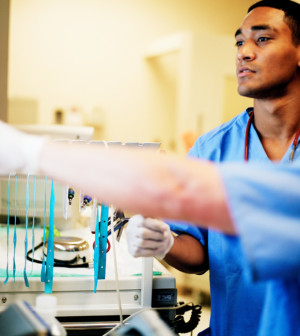- Double Mastectomy May Offer No Survival Benefit to Women With Breast Cancer
- Toxic Lead Found in Cinnamon Product, FDA Says
- Certain Abbott Blood Sugar Monitors May Give Incorrect Readings
- Athletes Can Expect High Ozone, Pollen Counts for Paris Olympics
- Fake Oxycontin Pills Widespread and Potentially Deadly: Report
- Shingles Vaccine Could Lower Dementia Risk
- Your Odds for Accidental Gun Death Rise Greatly in Certain States
- Kids From Poorer Families Less Likely to Survive Cancer
- Tough Workouts Won’t Trigger Cardiac Arrest in Folks With Long QT Syndrome
- At-Home Colon Cancer Test Can Save Lives
Health Highlights: Oct. 22, 2013


Here are some of the latest health and medical news developments, compiled by the editors of HealthDay:
Online Breast Milk Exchange Announces Policy Changes
An online breast milk exchange says it will change its policies after a study found that three-quarters of samples bought through the website contained high amounts of bacteria that could sicken babies.
An administrator with the Nevada-based organization that operates the website — called Only the Breast — released a statement on the weekend saying that the group plans to halt informal “mother to mother” milk sharing, the Associated Press reported.
The group will create a new breast milk bank program for sick babies that will feature better donor screening and “professional milk processing.”
“Donors will be fully screened, tested and instructed on safe handling methods,” and will be offered fair compensation, according to the statement, the AP reported.
Researchers analyzed 101 samples of breast milk purchased through the website and found that a few contained salmonella, while others had evidence of fecal contamination. The study was published online Monday in the journal Pediatrics.
—–
Research Backlog at NIH Due to Shutdown
It will take some time before research programs return to normal at the U.S. National Institutes of Health after the end of the federal government shutdown, officials say.
During the shutdown, 73 percent of NIH’s 18,646 employees were placed on enforced leave, according to Nature, CBS News reported.
About 6,000 researchers in NIH labs who were working on hundreds of experiments suffered a “profound loss of momentum,” with their research, the NIH said in a statement to Science magazine. The majority of projects were put on hold, and it may take “many months” to restart them.
It will also take time for the office in charge of handing out research grants to return to normal.
“The shutdown came at one of our busiest periods and it is going to take some time to bring the extramural program back to full strength,” Dr. Sally Rockey, NIH’s Deputy Director for Extramural Research, said in an agency blog, CBS News reported.
All October grant applications from researchers have been pushed back to November, and peer review meetings that were planned to take place during the shutdown or this week or next will be rescheduled.
—–
California Fighting Yellow Fever Mosquito
California officials have issued a warning about a mosquito species that can carry dengue and yellow fever.
The yellow fever mosquito, or Aedes aegypti, was first detected in June in Madera, and subsequently found in Clovis, Fowler, San Mateo County and Fresno, the Los Angeles Times reported.
Officials are spraying insecticide around infected homes in an effort to stop the spread of the yellow fever mosquito, which bites during the day.
“We were shocked,” Leonard Irby, district manager of Madera’s abatement program, told the Times. “We never expected this mosquito in California.”
“This affects all of California,” Irby added. “It requires everyone’s help: Turn over plant saucers, wash out dog bowls, remember this mosquito can lay eggs even in the cracks of cement if water is left there for a couple of days.”
The appearance of this mosquito “could change the way we live in California, if we don’t stop it,” Tim Phillips of the Fresno Mosquito and Vector Control District, told the Times. “Imagine not feeling safe to sit out in your backyard in the afternoons.”
Copyright © 2024 HealthDay. All rights reserved.










